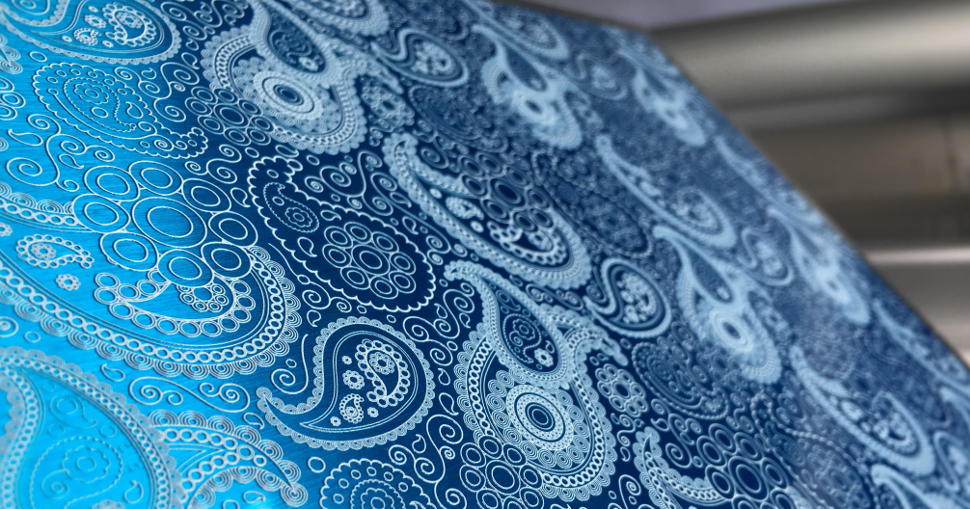The introduction and popularisation of LED UV flatbed printing has completely revolutionised the print industry. Whilst the early innovation of this technique required significant physical space, and a budget to match, the evolution from reputable manufacturers, such as Roland and Mimaki, has allowed for the introduction of cost-effective solutions with small flatbed options as an entry level alternative.
Endless opportunities
Flatbed printers can print onto practically anything… plastic, pvc, leather, stone, glass, ceramic, metal, wood, card… we often say that the opportunities are endless because each time we speak with a new customer, a new opportunity presents itself; balloons, toys, merchandise, packaging, manufacturing elements, even condom packaging (yes, that really happened).
The growing emergence of personalised print, and short-run requirements, has resulted in an increased reliance on digital direct-to-substrate printing over the alternative methods of screen printing, sublimation, pad print and wrapping, where possible.
Personalised printing and short-run requirements account for a significant proportion of print business today, and whilst there are significant profitable opportunities, the cost-effectiveness has often in the past been questionable – enter flatbed printing.
The set-up and system requirements for flatbed printers allows for extremely flexible print opportunities – it is so quick and easy to upload artwork, that the set-up is almost zero-cost in comparison to alternative print production methods, such as pad or screen printing, that require template artwork and individual processes for every product and variation.
Printing direct-to-substrate allows for custom and short run print projects. If traditional, manual print methods are holding your business back from growth, flatbed printing can provide a faster and more versatile solution.
Maximise your print potential with digital direct-to-object printing, allowing rapid customisation.
A few Christmases ago, we worked with a brand agency in a pop-up store in central London, where visitors could customise their packaging with their name (something that proves exceptionally popular with a variety of brands each Christmas), this was achieved by printing the packaging on a small flatbed printer, Roland’s VersaUV LEF. If you visit the LEGO store, you’ll find a similar set-up using the SF-200 which allows for sensitive applications, including toys, food containers and medical instruments. The SF-200 is different to the LEF in that it runs highly durable, yet safe eco-solvent inks, that meet very specific standards for safety.
These internationally renowned brands are recognising the potential flatbed print opportunities on offer, and are making the most of the diverse technology available.
Easy to use
The technology incorporated is not significantly different from the roll-to-roll printers that both Mimaki and Roland have been supporting for decades. There are no specialist skills required, but we do offer training on installation to allow you to feel confident in printing, along with how to maintain for your printer, the aftercare of which is minimal.
If you need to print short-run or personalised products, you’ll be pleased to know that the set up and process is convenient, rather than repetitive, and most importantly, quick.
Instantly dry
Our flatbed printers, from both Roland and Mimaki, use UV LED curable inks, which mean they’re instantly dry and ready to move on to finishing. The inks produce durable prints that are weather resistant, with no need for over-lamination – saving time and costs!
Versatile opportunities
Print onto almost anything, with freedom on print run, quantities, sizes, and shapes, including rounded items. Whether it’s a golf ball, wine bottle, candle, water bottle – you can use a small flatbed printer to print directly to it; you no longer need to print and apply decals or outsource to a dye-sublimation or pad printer with high costs associated, simply print direct to the object.
What can you print?
The better question is what can’t you print?
Large scale flatbeds like the Mimaki JFX can be used for board printing, such as estate agent signs, signage in general, furniture, POS, décor… it presents the ability to print large graphics direct to board or substrate quickly, for immediate application.
Smaller flatbeds like the Roland LEF or Mimaki UJF are more suitable for merchandise, packaging, personalised goods, customisation etc. Determining what you want to print, and how familiar you are with the technology, will define our recommendation on which device is most suitable for you.
What next?
There are plenty of diverse solutions in the market, we supply and support flatbed printing solutions that we believe in, from both of our partners; Roland and Mimaki.
The ability to offer both puts us in a unique position to be able to recommend the printer that best fits your requirements; whether you’re restricted on space or budget, if you have a particularly unique product, or if you have previous experience having used either brand.
Our best advice is to speak to an expert to explore the opportunities available to your business. Our Head of Sales, Chris Martin, has helped countless customers introduce flatbed printing to their business, in some instances they had previous print experience and in others it was a completely new venture.
We can then help to produce bespoke samples or demonstrate the technology available.
Authored by Chris Martin, Head of Sales, printMAX





